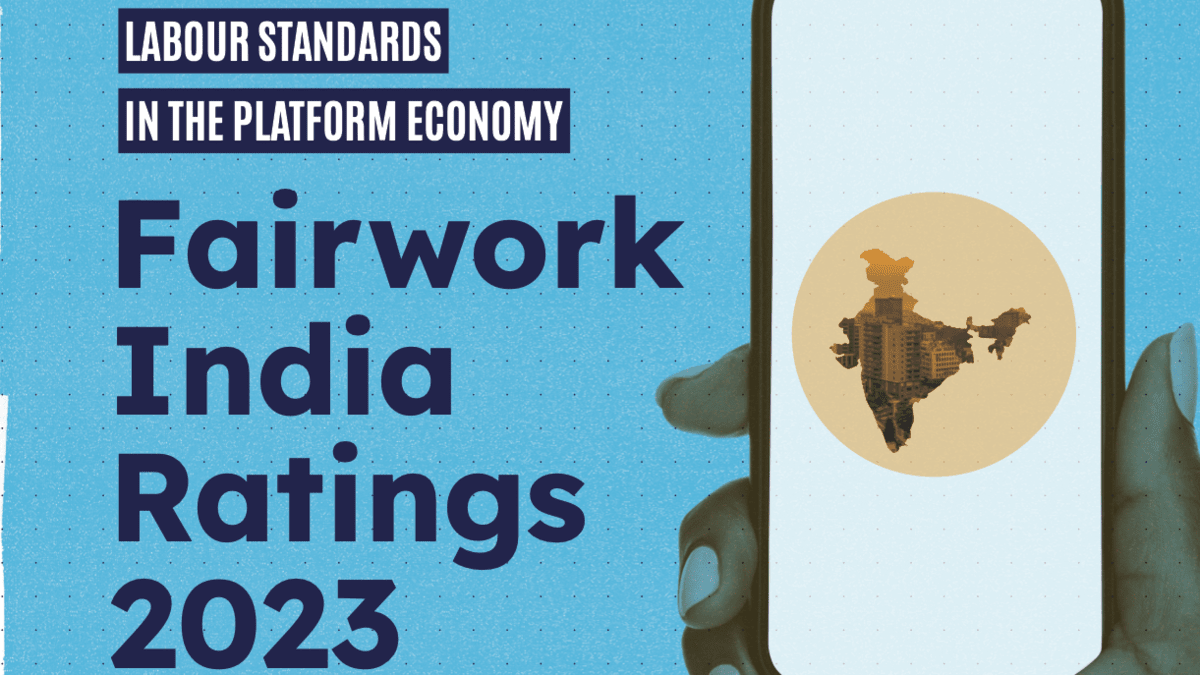Key highlight:
- The ratings assessed the gig platforms on five principles – pay, contracts, conditions, management, and representation.
The recently released Fairwork India Ratings 2023 report, which delves into the working conditions of platform workers on digital labour platforms in India, has highlighted a glaring issue.
None of the 12 platforms assessed in the report managed to score any points on the principle of fair representation. Fair representation, signifying the recognition of a collective body or trade union for workers, is a vital aspect of fairness at work, yet the report found no evidence of any platform’s willingness to acknowledge such representation.
The 12 platforms included in the assessment were Amazon Flex, BigBasket, BluSmart, Dunzo, Flipkart, Ola, Porter, Swiggy, Uber, Urban Company, Zepto, and Zomato. Among them, Ola, Uber, and Porter emerged as the poorest performers, scoring either zero or just one point on a scale of 1-10. This information was disclosed in the ‘Fairwork India 2023’ report, led by the Centre for IT and Public Policy (CITAPP) at the International Institute of Information Technology Bangalore (IIIT-B) in collaboration with Oxford University.
Assessing digital labor platforms
Fairwork employs a rigorous assessment to evaluate the working conditions of digital labor platforms, anchored in five fundamental principles that these platforms must adhere to in order to be recognized as providers of “fair work.” These principles, initially developed through extensive multi-stakeholder workshops at the International Labor Organization (ILO), have been meticulously adapted over the years to ensure their applicability within the Indian context.
Fair Pay, the first principle, emphasizes that regardless of employment classification, workers should earn a decent income that considers local work-related costs, including both the mandated minimum wage in their home jurisdiction and the prevailing living wage.
Under Fair Conditions, digital labor platforms are expected to have policies in place to shield workers from foundational workplace risks and proactively promote worker health and safety.
Fair Contracts, the third principle, mandates that the terms and conditions of work agreements must be readily accessible, comprehensible, and subject to local law. These agreements should explicitly identify the contracting parties and be devoid of clauses that unreasonably absolve service users or platforms from liability, irrespective of the worker’s employment status.
Fair Management, the fourth principle, stipulates the presence of a documented process through which workers can voice concerns, appeal decisions affecting them, and receive clear explanations for such decisions. It also requires a transparent channel of communication for workers to challenge management decisions or deactivation. In addition, the use of algorithms in decision-making should be transparent and yield equitable outcomes for workers. Furthermore, a documented policy is essential to ensure equity in the management of workers on the platform, from the hiring process to disciplinary actions and terminations.
The final principle, Fair Representation, calls for platforms to establish a documented process that allows workers to express their collective voice. It grants workers, regardless of their employment classification, the right to organize within collective bodies, while platforms must be willing to engage in cooperation and negotiations with these organized worker groups.
Interestingly, BigBasket, Flipkart, and Urban Company were the only platforms found to have a minimum wage policy, guaranteeing that their workers earn at least the hourly local minimum wage while considering work-related expenses like fuel, vehicle maintenance, insurance, and data.
One noteworthy observation was that BluSmart, a newcomer in the industry, managed to score 5 points out of 10, outperforming more established platforms in its sector. This has raised optimism that BluSmart’s operational model might pave the way for improved conditions for drivers in the platform economy.
However, the report noted that no platform met the requirements for the second point under the “Fair Pay” principle, which calls for platforms to provide adequate evidence that workers earn at least the local living wage after factoring in work-related costs.
When it came to “Fair Contracts,” only seven out of the 12 platforms met the criteria by ensuring accessible and comprehensible contracts for workers. These platforms introduced measures such as change notification clauses, reduced asymmetries in liability, adoption of a Code of Conduct for subcontractors, and transparent pricing variables where dynamic pricing was employed.
Call for urgent regulations
The survey also delved into consumers’ perspectives regarding the roles of both platforms and government in enhancing the working conditions of platform workers. A significant majority of consumers concurred that workers should receive a living wage, accounting for various work-related expenses like fuel, meals, and uniforms. They expressed support for various measures to ensure this, such as reducing platform commissions, increasing consumer delivery fees, boosting tipping, and introducing government regulations.
Remarkably, eighty percent of consumers across all 12 surveyed cities were well aware of the challenges faced by platform workers, including long working hours, challenging weather conditions, and dealing with difficult customers. A substantial percentage of respondents strongly advocated for platforms and government regulations to prioritize safe working conditions. This includes provisions for health and accident insurance and facilities to ensure worker safety and rest.
Keep up to date with our stories on LinkedIn, Twitter, Facebook and Instagram.

